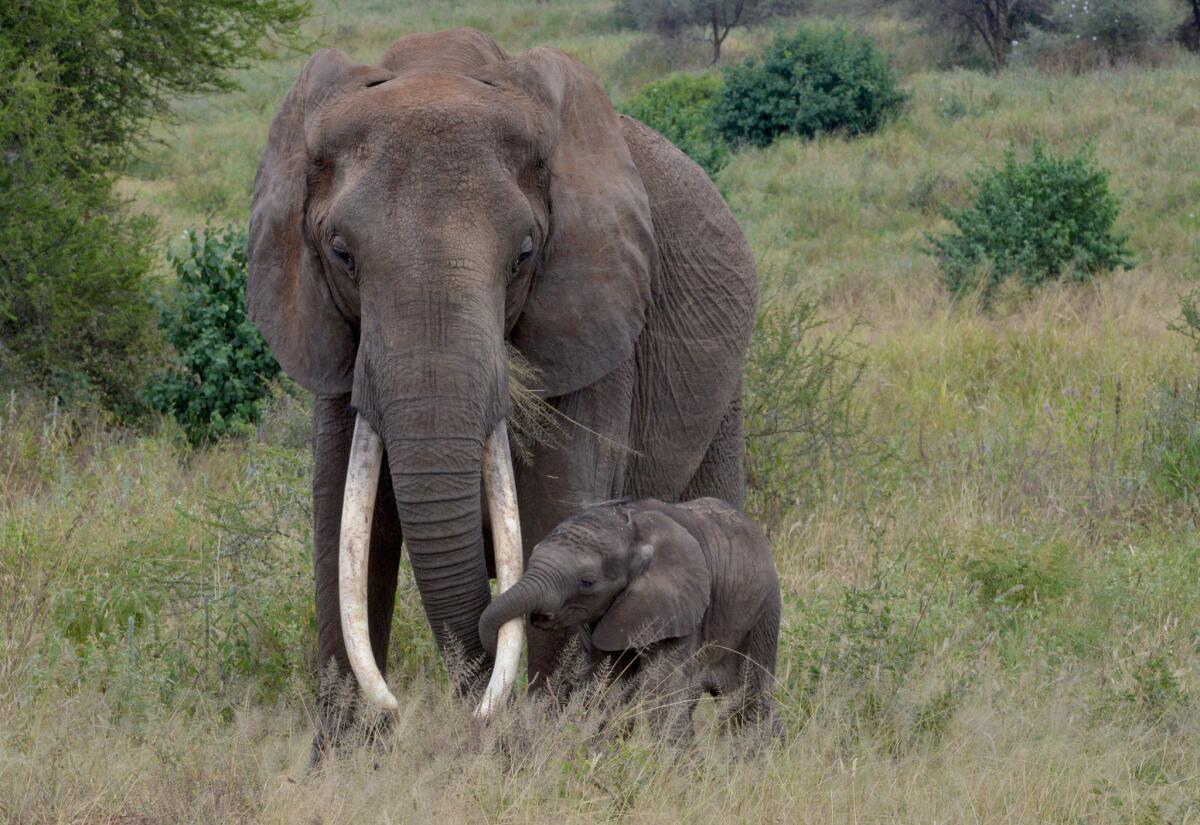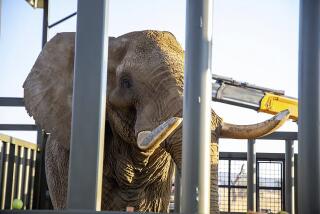Chinese officials accused of smuggling African ivory on official visits

Visits to Africa by high-level Chinese delegations, including a presidential trip, have been used to smuggle ivory, contributing to an explosion in poaching that has cut Tanzania’s elephant population in half over the last five years, according to a report by an environmental group released Thursday.
In December, a visit by a Chinese naval task force to the Tanzanian capital, Dar es Salaam, created a surge in business for ivory traders, with one dealer based in the Mwenge handicrafts market boasting of making $50,000 in sales, the Environmental Investigation Agency said in the report.
A Chinese national was caught trying to enter the port with 81 illegal tusks intended for two mid-ranking Chinese naval officers, said the group, which has offices in London and Washington.
The visit by Chinese President Xi Jinping in March last year coincided with another boom in sales that reportedly caused black market prices to double.
Chinese officials rejected the report as groundless. A spokesman for the Ministry of Foreign Affairs, Hong Lei, told reporters that China has “consistently” opposed poaching and has sought to crack down on ivory smuggling.
Meng Xianlin, director general of the Endangered Species Import and Export Management Office of China, said he had never heard of involvement by official Chinese delegations in the ivory trade.
“I don’t think there’s hard evidence,” Meng was quoted as saying by the Associated Press. “Allegations without evidence are not believable, and I don’t think it is appropriate for [the environmental group] to come up with this mess.”
According to the report, Chinese diplomats in Tanzania have been regular buyers of illegal ivory since 2006, but Xi’s visit proved to be a bonanza.
It was the Chinese leader’s first overseas trip, shortly after his inauguration, and he was accompanied by a large delegation of government officials and businessmen. The visit, including stops in Tanzania and South Africa, was seen as a sign of the continent’s importance to China.
Two smugglers interviewed by undercover investigators from the environmental group said that in the two weeks before Xi’s visit, Chinese buyers flooded the market. As they snapped up thousands of pounds of ivory, the price doubled to $320 a pound, they said.
“The price was very high because the demand was high. When the guest come, the whole delegation, that’s then [the] time when the business goes up,” one of the smugglers, identified only as Suleiman, told the investigators.
Diplomatic bags were used to smuggle the ivory to China on the presidential plane, according to the report.
Another Dar es Salaam dealer described a similar incident during a visit by Xi’s predecessor.
“You know when the [previous] president of China, Hu Jintao, was coming to Tanzania? They come to take many things. But that was not for Hu Jintao, it was the whole group. Then they go direct to the airport, because VIP no-one checks your bags,” the dealer told the group.
The report blamed the poaching crisis in Tanzania on a “toxic mix of criminal syndicates, often led by Chinese nationals, and corruption among some Tanzanian government officials.”
Since Xi took office, China has issued more than $10 billion in loans to African countries. Its African trade was worth 5% of China’s total last year, with infrastructure projects valued at more than $40 billion.
But Chinese investment has a downside, environmentalists allege. Thursday’s report is not the first to draw a link between increased Chinese activity in Africa and a spike in wildlife poaching. Agencies such as Traffic have accused Chinese nationals of involvement in rhino horn smuggling, which has increased sharply in recent years, with China one of the world’s top destinations.
By mid-September, 769 rhinos had been poached in South Africa this year, most of them in the state-run Kruger National Park, according to government figures. The country appears likely to surpass last year’s poaching total of 946. Vietnamese nationals – including diplomats in South Africa -- have also often been implicated in the illegal rhino horn trade.
After rampant elephant poaching in the 1970s and 1980s, the Tanzanian population declined from about 110,000 to 55,000, the report said. A 1989 ban on the ivory trade saw Tanzania’s elephant population recover to almost 143,000 in 2006. But the country has lost two-thirds of its elephants since then.
“Available evidence indicates it has since lost more elephants to poaching than any other country in Africa and is the biggest source of illegal ivory seized around the world,” the report said. “Its once mighty herds are being devastated by remorseless criminal organizations.”
Transparency International, the Berlin-based agency that monitors corruption worldwide, reported in 2013 that the country suffers from “rampant corruption” with perceptions that the problem has worsened in recent years. A World Bank report in 2013 also noted increased corruption and declining government effectiveness since around 2005.
Tanzanian wildlife, police and customs officials are often implicated in ivory poaching, smuggling or the corruption that allows the trade to flourish, according to Thursday’s report. Few perpetrators are prosecuted.
The report analyzed the eight biggest seizures of poached ivory in Tanzania since 2009, which totaled 26.5 tons– equivalent to the loss of nearly 4,000 elephants. In some cases, the accused were granted bail and fled. In others, prosecutions stalled and suspects were released.
Only one man was jailed, Yu Bo, the Chinese national who made $50,000 in sales during the naval task force’s visit. He was fined $5.6 million, but since he couldn’t pay, he was sentenced to 20 years in prison.
“The responsibility lies at the highest levels of the Tanzanian government,” the report said. “When President Jakaya Kikwete assumed office in 2005, the country had about 142,000 elephants. By the time he steps down in late 2015, the population is likely to have plummeted to about 55,000.”
For news from Africa, follow @RobynDixon_LAT on Twitter
More to Read
Sign up for Essential California
The most important California stories and recommendations in your inbox every morning.
You may occasionally receive promotional content from the Los Angeles Times.










